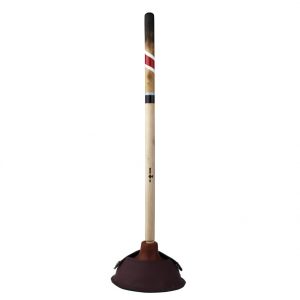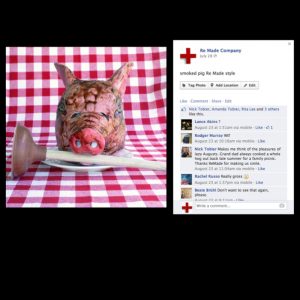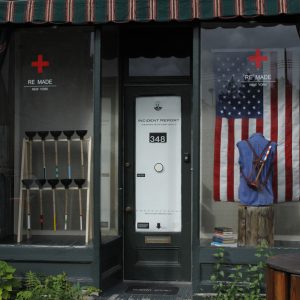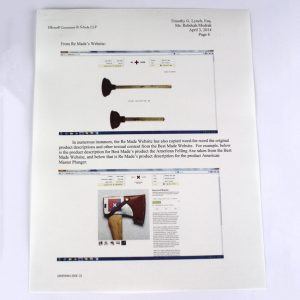Re Made Co. is a web-based artwork that appears to be a company selling $350 hand-painted toilet plungers. The work satirizes the brand narrative of Best Made Co., a New York City-based company that sells $350 designer axes. Re Made’s sustained and evolving parody—involving company website, product portfolio, catalogs, social media, and product review—satirizes Best Made’s hijacking the tools of manual labor as trophies of “work” for an affluent, white-collar consumer base. The work reveals and critiques Best Made Co. themes that glorify white masculinity, aggression, the desire to conquer nature, and the glorification of America’s pioneer past.
The Re Made Co. work has multiple parts, including:
RE MADE BRAND VIDEO
Best Made’s “American Felling Axe” brand video presents Best Made founder Peter Buchanan-Smith describing the axe as “embedded in our DNA” and “a tool that builds America.” The video’s images and rhetoric provide a complex inventory of masculinity, from manly competence and conquest, and a commentary on the positioning of “craft” and “design” as tools to elevate the elite. The Re Made “American Master Plunger” brand video (here, side-by-side with the original) applies Buchanan-Smith’s words to the artisanal plunger.
RE MADE SOCIAL MEDIA
The Re Made Co. Facebook page provides an opportunity for further study of Best Made’s archive of images, to deepen the parody, and to extend the boundaries of the work by allowing response from browsers. The hundreds of Re Made Co. Facebook images start to reveal categories, characters, and stylistic approaches in Best Made’s brand messaging.
RE MADE NEWS PARODIES
Re Made Co. recreates published reviews of the Best Made store and products by newspapers such as The New York Times, with minor substitutions, such as “plunger” for “axe.” These re-created articles use the authoritative language of the mainstream media to critique their failures— the celebration of white upper-middle-class men sharpening their axes, without any discussion of race, class, gender, or the cultural appropriation of labor. These stories are available within the “Our Story” page of the Re Made website.
RE MADE ADVENTURES
Best Made has posted a series of “Adventures,” starring products such as the $188 Work Shirt. In their “Summer in Hoisingon, Kansas” adventure, Best Made photographed farmers and oil drillers, splattered in mud and oil, and dressed in the Work Shirt, alongside scenes of founder Peter Buchanan-Smith hanging out in local settings. To create the Re Made Co. “Adventure,” local farmers and well drillers in Hamilton County, Nebraska collaboratively restaged the Best Made Kansas Adventure in order to critique Best Made’s Plain State’s romanticism.
THE LAW and FAIR USE
Eight months after Re Made Co.’s launch, Best Made Co.’s lawyers sent a cease and desist letter claiming that I had stolen Best Made’s “work.” Attorneys from the University of Michigan’s Office of General Counsel championed the Re Made artwork and my first amendment rights. Their support and the protection of Fair Use enabled the work to stay online. If Re Made Co. itself points to the economic and social contradictions that lie beneath Best Made Co.’s branding, the cease and desist document humorously re-creates this work (extensively comparing axes and plungers) and overtly displays the aggression that’s at the heart of Best Made. The cease and desist document is only viewable on this website.
PRESS
Mark A. Rademacher and Casey R. Kelly, “Constructing Lumbersexuality: Marketing an Emergent Masculine Taste Regime,” Journal of Communication Inquiry, September 2018.
Daniela K. Rosner, Critical Fabulations: Reworking the Methods and Margins of Design, MIT Press, May 2018.
Glenn R. Carroll and Dennis Ray Wheaton, “Donn, Vic and Tiki Bar Authenticity,” Consumption Markets & Culture, April 27, 2018.
Jonathan Bean, Avid Khorramian & Kelsey O’Donnell, “Kinfolk Magazine: Anchoring a Taste Regime,” Consumption Markets & Culture, February 2018. DOI: 10.1080/10253866.2017.1334282
Jessica Barness and Steven McCarthy, “Critical Practices as Design Scholarship,” Design Incubation, October 2017.
Maclaran, Pauline, Cele C. Otnes and Linda Tuncay Zayer. “Gender, Sexuality and Consumption.” Routledge Handbook on Consumption, edited by Margit Keller, et al., Routledge, 2017, pp. 292-302.
Patricia Aufderheide, “What a Difference a Code Makes.” Fair Use Week, March 2017. Web.
Meredith James, “LIVD: An Avant-Garde Publication with Pedagogical and Epistemological Aims.” Design Research Society, Brighton: UK, 2016.
Rain Noe, “ ‘Maker Story’ Parody Videos are Becoming Better Than the Real Thing,” Core77, March 1, 2016. Web.
Patricia Aufderheide, “Fair Use Week: Plenty to Celebrate.” Center for Media and Social Impact, February 22, 2016.
Laurie Meamber, “Commentary on learning to talk like an (urban) woodsman: an artistic intervention.” Consumption, Markets & Culture. 18, 6, 559-568, Dec. 2015. ISSN: 10253866. Double-blind peer review process.
Sendhil Mullainathan, “Why Computers Won’t Be Replacing You Just Yet,” The Upshot: The New York Times, July 1, 2014.
Rob Walker, “Object vs. Object.” Design Observer, May 12, 2014. Web.
Mark Maynard, “Food, Sex and Trauma: Mark Maynard Shoots the Shit with the Most Important Artists of Our Day … Episode 2: Rebekah Modrak.” MarkMaynard.com, May 4, 2014.
Schiller, Ben, “5 Futuristic Trends That Will Shape Business and Culture Today.” Fast Company, January 28, 2014.
Stewart, Lea, “Fake Artisan Plunger Company Poo Poos ‘Authentic’ Branding.” Inhabitat, December 31, 2013.
Metcalfe, John, “This $350 Plunger Inspired by Abraham Lincoln Doesn’t Actually Exist.” City Lab, December 10, 2013.
Alter, Lloyd, “Remade Introduces the Artisanal Toilet Plunger.” Treehugger, December 9, 2013.
Maynard, Mark, “Artisanal Toilet Plunger or Iconic Felling Axe … Can You Tell Which is Parody?” MarkMaynard.com, December 4, 2013.
Hu, Ray, “Remade Co. (Semi-Literally) Takes the Piss Out of a Certain Axe Company.” Core77, December 3, 2013.
Casimiro, Steve, “Re Made Toilet Plunger Company.” Adventure-Journal, November 22, 2013.




